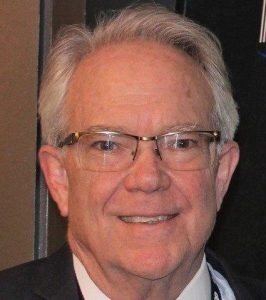Where are the lines being drawn between robots and humans, and looking ahead, how are costs, complexity, sustainability, and potential biases in cybersecurity and artificial intelligence (AI) technologies to be managed?
Our old friend Alan Shark, Executive Director at the Public Technology Institute (PTI) – a division of Fusion Learning Partners – welcomed nearly 100 live and virtual attendees from local government leaders, academia, and their vendor community partners to PTI’s 2024 Cyber and AI Summit on May 2 to drill down into those topics.
Sponsored by the Center for Internet Security, media sponsor MeriTalk, and hosted at the IBM Innovation Studio in downtown Washington, D.C., the summit was an opportunity to step into the intersection where artificial intelligence and security connect.
Leading AI and cyber experts guided the conversations, shared the latest industry/technology news, and helped drive awareness on these two critical topics. The experts hailed from jurisdictions throughout the nation – from east coast to west coast and in between – plus technology organizations including IBM, Presidio, MS-ISAC, the National League of Cities, the Election Infrastructure Information Sharing and Analysis Center, and Citibot.
Shark in his opening remarks described the summit as a powerful opportunity to prepare for where AI and Cyber are heading. Looking into the near future and approaching it at an incredibly rapid pace, AI will play an increasingly important role in cybersecurity, he said.
“We are nearing a time when the two will become inseparable, working hand-in-hand. As this integration happens, the AI/cyber landscape is becoming simpler, and more complicated, both at the same time,” he said.
Shark said this year’s conference was the first to tackle both issues as side-by-side subjects “where we combine artificial intelligence and cybersecurity. We know these are the two top issues that come up with every survey we’ve done the last five years.”
The 800-pound gorilla in the room that has grabbed everyone’s attention is the intense interest in creating “guardrails” around AI development. “I think from the user end, we need guardrails. And for the manufacturer, the vendor side, they also need guardrails because the technology can be scary,” Shark said.
But Shark emphasized that such caution should not impede progress. “I was at a conference not too long ago and the biggest frustration expressed by a number of people there was that many are so risk averse that they’re afraid to try and experiment. And that’s the last thing to we need to do.”
And sandboxes to play with are critical for success. “User groups within local governments must try to triangulate what’s going to work, what’s available and the last one, it’s a tough one, vendor accountability,” Shark said.
This ability to ask the right questions of local government vendors, he said, is paramount. “We can’t create artificial intelligence. We must choose what’s available to us and figure out how it best works within our needs, systems, and environment. Therefore, a trusted vendor relationship must also be tested to make sure that what they say is delivered,” Shark said.
He then reviewed the agenda, introducing an excellent mix of presenters and panels, including a luncheon keynote by our friend Dan Lohrmann who is Field CISO, Public Sector at Presidio. Lohrmann – Michigan’s first CISO and author of both Cyber May Day and The Day After – has been working with global CxOs and partners advising clients on cybersecurity best practices and solutions.
As an added final treat, attendees were offered a tour of the IBM Innovation Studio’s X-Force Cyber Range. The range’s solution creates immersive simulations to guide team through realistic breach scenarios, helping ensure they can respond and recover from enterprise-level cyber security incidents, manage vulnerabilities, and build a stronger security culture in organizations.

